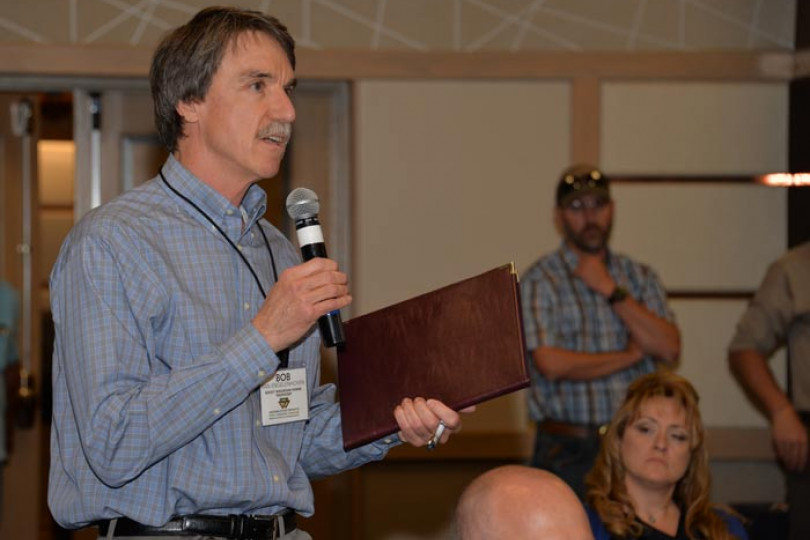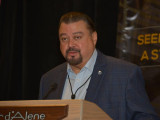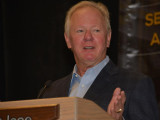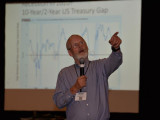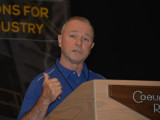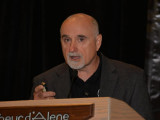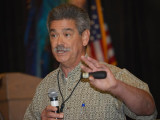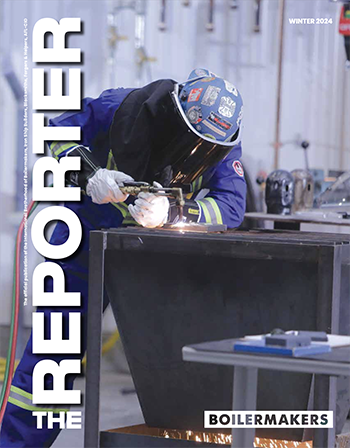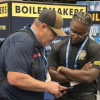“We’re working hard so that all of our commitments are met and so that when a contractor comes into California to do a project, he can quantify how many people he’s going to get, how much time it’s going to take, and he can leave with a profit and a smile. It’s our job to make that happen.”
— Robbie Hunter, SBCTCC President
Bob Van Engelenhoven of Rocky Mountain Power, PacifiCorp, raises a point for the Boilermakers, contractors and other employers to discuss.
View Photo Gallery (8 photos)
Owners, contractors, Boilermakers come together to address industry challenges
INTERNATIONAL VICE PRESIDENT-Western States J. Tom Baca called them the “yin and the yang” of the Western States Section: A biomass (eucalyptus-burning) plant-build on tropical “Big Island” Hawaii and a coal plant project in frigid Fairbanks, Alaska. Featured in two short films during the 2018 Western States Tripartite Conference in Coeur d’Alene, Idaho, this past July, those two Boilermaker projects also illustrate the uniquely complex challenges faced by owners, contractors and Boilermakers spanning the Western States’ diverse projects and landscapes in an ever-evolving industry.
That’s exactly why the tripartite conference exists.
“We started our tripartites over 20 years ago to bring everyone together — owners, contractors and Boilermakers — in one place to talk and solve problems,” IVP Baca reminded participants. “I’m glad we all take a little time for this. Really, this is for our owners, so we know what you need. That’s how the Boilermakers work. You tell us what you need, and we come in and get the job done for you.”
Getting the job done means making sure enough Boilermakers are available to do the job. Organizing, recruitment and manpower scheduling were major discussion focuses during the four-day event.
“We are dedicated to making sure we have the qualified manpower available on time, ready to go to work when they’re needed,” International President Newton B. Jones told attendees. “We are going full-bore into recruiting and training and building the capabilities and skills this craft needs to go forward.”
IP Jones went on to outline the M.O.R.E. Work Investment Fund, the strategic plan designed to do just that by increasing Boilermaker marketing, organizing, recruitment and employment. He pointed out that the Western States Section is leading the charge, having piloted an early model of the initiative. All Boilermaker areas have confirmed their commitment to the plan.
Manpower scheduling was another key component discussed at the conference. Mark Keffeler, International Rep in the Western States, talked about the challenges faced by the union, particularly when outages overlap and the demand for welders exceeds the number of qualified craftsmen available.
IVP Baca emphasized that manpower challenges are being addressed and that the M.O.R.E. Work Investment Fund will provide the structure and resources to enhance craft availability. “We’re going to man our work. Period,” he said. “And we’re going to man it with the best trained Boilermakers.”
Complementing the manpower scheduling discussion, keynote speaker Dr. Peter Philips, Professor and Chair of Economics at the University of Utah, focused on Boilermaker labor shortages in Construction Sector Operations and the ebb and flow of manpower needs relative to economic factors.
“One of the things that was implicit in the conversation about manpower scheduling was that there is an institution that can think about — in the Western States or even nationally — how to move the chess pieces around so that you’ve got the right people, in the right place, at the right time,” Philips said. “That institution is a union. Unions are the only institution that can think about that across owners, across contractors, across states. They are one necessary component in solving the problem of efficiently allocating this labor in ways that address labor shortages.”
Robbie Hunter, President of the State Building and Construction Trades Council of California, also addressed the conference as a keynote speaker, giving an overview of recent labor activities in California — which included taking out a full-page L.A. Times ad blasting politicians on both sides of the aisle for ignoring labor issues. He also shared good news about potential new refinery contractors on the horizon. Hunter brought the discussion back to the importance of tripartite partnerships among owners, contractors and unions and solving industry challenges together.
“We understand that if our contractors don’t make money, they’re not going to be here,” he said. “We need them to make money, and we need to meet their needs. We’re working hard so that all of our commitments are met and so that when a contractor comes into California to do a project, he can quantify how many people he’s going to get, how much time it’s going to take, and he can leave with a profit and a smile. It’s our job to make that happen.”
